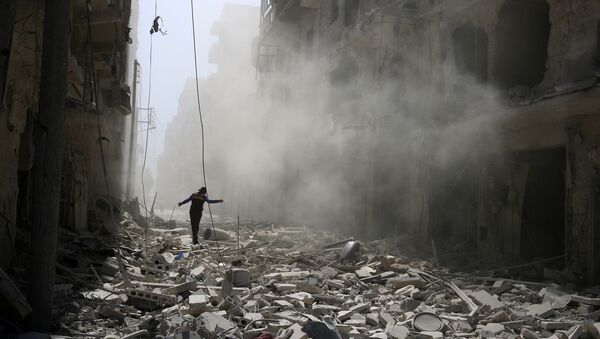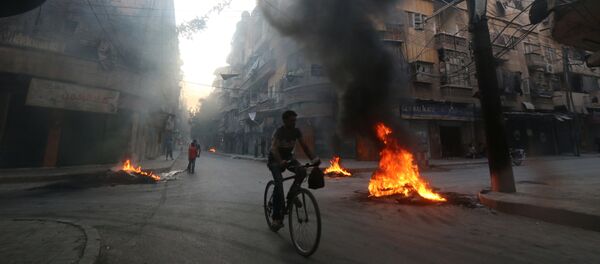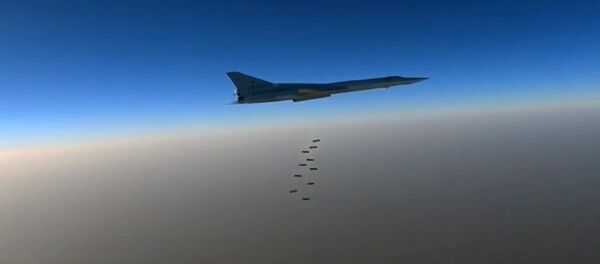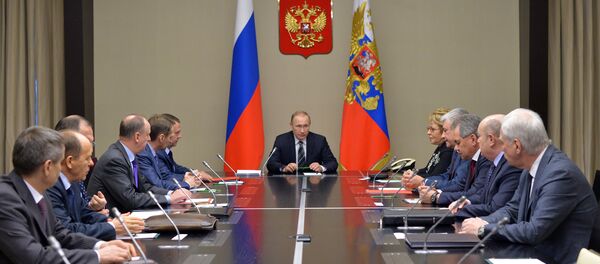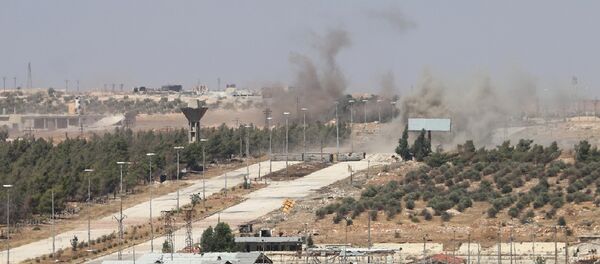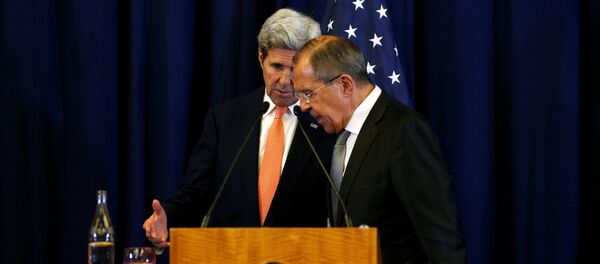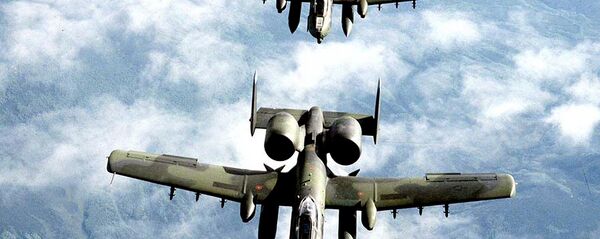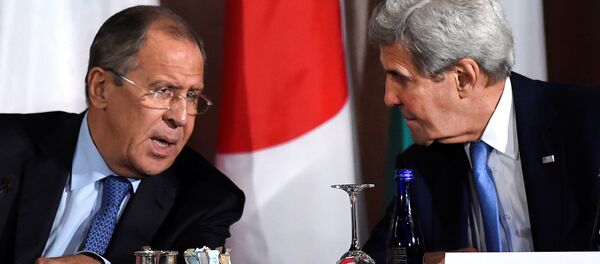Throughout the course of the aerial campaign, Russia has been insistently calling for broader cooperation with the United States, aside from coordinating efforts to help solve the Syrian crisis and ensuring the safety of their separate anti-terror operations in the Arab republic. However, the US side has been reluctant so far to embrace the opportunity of reaching a comprehensive cooperation deal.
"To our regret, we are still far from real cooperation," Kremlin spokesman Dmitry Peskov said in late August.
Ensuring Aircraft Safety
Following a series of close calls between Russian and US planes in Syria’s airspace during the first month of the Russian campaign, the two countries’ defense officials signed a memorandum on the prevention of similar incidents in the future on October 20, 2015.
According to Pentagon spokesman Peter Cook, the signing of the memorandum shows Washington’s "willingness to work with the Russians when it’s in our own interest."
At the same time, Russian Deputy Defense Minister Anatoly Antonov noted the agreement proved "the high potential of cooperation between Russia and the United States, including in the fight against terrorism," which Russia is ready to "expand and deepen."
In December, US Air Force Chief Deborah Lee James said that US and Russian military officials speak two times a day to ensure safety of operations in the Syrian airspace. According to James, the United States shares the information on Russian flights in Syria with members of the coalition.
According to US Defense Secretary Ashton Carter, the Russian military has been "professionally" operating flights in Syria in coordination with the United States.
"We [US and Russia] have a memorandum of understanding, we talk at the working level and make sure we’ve safety of flights. They’ve been behaving very professionally in that regard," Carter said in February.
Despite the successful implementation of the memorandum, no more deals on coordination have been signed by the sides as Washington has since rejected all Russian initiatives for enhanced cooperation in fighting terrorism in Syria. "We do not collaborate or coordinate our operation with the Russians. As the Secretary [Carter] has said, Russian operations are supporting and enabling the Assad Regime which is like pouring fuel on a fire. We remain focused solely on degrading and defeating ISIL [Daesh]," US Department of Defense spokesman Matthew Allen told Sputnik on May 20.
Monitoring Fragile Ceasefire
After the first Russia-US truce on Syria was signed in February 2016, Russia opened a special monitoring center at the Hmeymim airbase in Syria to monitor and report all ceasefire violations.
A joint Russia-US center to monitor the ceasefire implementation in the war-torn Arab country has also been launched.
The Russian-US monitoring center started its work in Geneva in May with the aim to oversee the implementation of the Syria ceasefire regime, which has been in place in parts of the country since late February.
The opening of the joint Russian-US center for Syria ceasefire monitoring has brought the bilateral cooperation on that issue to a new level, Russian Foreign Ministry spokeswoman Maria Zakharova said on May 6.
"This interaction could be more active and more effective. At the same time, we are satisfied with the fact that the opening of such a center in Geneva on the UN platform has brought [the Russia-US] cooperation [on Syria] to a certain new level," Zakharova said.
In September, UN Special Envoy for Syria Staffan de Mistura called to improve work of joint Russian-US operation center in Geneva to identify those responsible for ceasefire violations in Syria.
"This operation center where the Russian and American military are present in Geneva has been pretty good at monitoring through local contacts, through NGOs, through the media but also directly through Syrian people… What needs to be better — identify those who started it, which is complicated sometimes, and how to stop it — what type of deterrence, punishment, if you want, will be applied to those to break the agreement on the ceasefire," de Mistura said.
Work of Baghdad Information Center
Russia has made attempts to engage the United States in coordinating anti-terror activities in Syria through an information center in Baghdad as well, which was established jointly with Iran, Iraq and Syria in September 2015.
The stated aim of the Baghdad Center is to collect, process, summarize and analyze current data about the Middle East in the context of counterterrorism measures against Daesh, distributing intelligence between the general staffs of the four countries.
According to Kremlin spokesman Dmitry Peskov, US experts and military officials were invited to work in the center. "Unfortunately, they did not attend first meetings and discussions of the center," he said in late September 2015.
In September 2016, amid reports of closure of the center, the Russian Defense Ministry issued a statement denying the claims."The Baghdad center remains an important tool of practical cooperation among all participants of the fight against the Islamic State terrorist organization…while all our partners have reaffirmed their interest in further development of such cooperation," the statement said.
Calls for Intel Data Sharing
Over the course of its operation in Syria, Russia has repeatedly called on the United States to launch bilateral intelligence data sharing on terrorist targets in Syria and to provide a list of militant groups active in the Arab republic that belong to the so-called moderate opposition and are not in fact terrorists.
In February 2016, Deputy Russian Defense Minister Anatoly Antonov said that Washington had rejected Moscow’s proposal to set up a joint consultation center on cooperation on Syria in Jordan’s capital of Amman.
"We proposed to the United States, in the first place, and to other Western countries to create a joint consultations center to solve issues of cooperation. We suggested that the possible location should be Amman," Antonov said, adding that the proposal was declined.
In June, Kremlin spokesman Dmitry Peskov said Russia regrets that despite regular exchange of information there is still no cooperation between Moscow and Washington on anti-terrorist efforts in Syria.
"We regret to state that there is still no cooperation during the counterterrorist operation in Syria, but at the same time I would like to remind – and [Russian] President Putin spoke about this – that we exchange information with our US partners through the existing communication channels twice a day. So the exchange of information is really taking place," Peskov said.
"Kerry said we need a no-fly zone over Syria. It would create a situation where the Russian or Syrian air forces are not allowed to target al Qaeda. Collaboration and ceasefire is not possible under those circumstances," Chossudovsky told Sputnik.
New Peace Deal
Foreign Minister Sergey Lavrov and Secretary of State John Kerry agreed in Geneva, to establish a Joint Implementation Center (JIC), where the two countries would exchange information on strike targets, should the newly-brokered ceasefire in Syria hold for at least seven days and all other provisions be implemented.
"We expect that in accordance to agreements the United States will provide us with extra data to work on IS targets," Russian Deputy Foreign Minister Sergey Ryabkov said, speaking on September 14.
The truce, agreed by Russia and the United States on September 9, required Washington to separate moderate opposition forces from jihadist groups and remove rebels from the Castello Road on Aleppo’s outskirts, which is a key route into the eastern part of the city.
The Russian military requested data on terrorist-controlled areas, US plans of pulling out armed groups from the Castello Road, proposals to set up a round-the-clock "hotline" between the Russian military in Syria’s western Latakia province and their US counterparts, as well as investigation of ceasefire violations by Syrian opposition forces.
However, later in September, Russian Defense Ministry said it was disappointed with Washington’s slow response to requests to share data on terrorist-held areas in Syria and progress in withdrawing rebels from a key road to Aleppo.
"We have to note extremely low activity of US colleagues in addressing our legitimate concern. For instance, we submitted to Americans a total of 16 information requests since the first day of the truce, September 12, 2016," Col. Alexander Zorin, the Defense Ministry’s special envoy to Geneva, said.
Political analyst Vladimir Sotnikov from the Institute of the World Economy and Foreign Relations believes that while the West denies seeking compromise with Russia for better cooperation in Syria, the only party that benefits from the situation is the terrorist groups active in the country. According to Sotnikov, the West should reconsider its stance and to decide what is more important for it – fighting terrorism or not having to work with Russia – while terrorism could soon spread across not just the Middle East region, but the whole world.
"The winners [from the inconsistency of the Russian and Western actions] are terrorists, Daesh in particular," Sotnikov told Sputnik.
US-Led Coalition's Attack on Syrian Army Positions
Lavrov slammed the attack, which killed 62 Syrian soldiers, as a flagrant violation of the Russia-US brokered ceasefire regime. He urged Washington to investigate the incident and prevent the collapse of the truce.
"It is urgent now to avoid the collapse of this plan, to investigate impartially and thoroughly the Aleppo and Deir ez-Zor incidents derailing it, especially considering that many would like to sabotage the joint approach to Syrian conflict solution," Lavrov said in his address at the UN General Assembly.
Although the United States immediately admitted its planes carried out the attack it did not miss an opportunity to criticize Russia for its reaction to what had happened.
"Now, because of a single airstrike – a strike that, if it struck regime forces, did so in error; a strike that we have swiftly acknowledged and committed to investigating – again, none of which the Assad regime or Russia have done in their airstrikes on innocent civilians. Now, of all times, Russia calls the entire UN Security Council to convene urgently so that it can stand up here and express outrage," US Ambassador to UN Samantha Power said.
"Given the fact that militants do not abide by the ceasefire regime, we believe that there is no sense in unilateral compliance with the ceasefire by the Syrian government forces," chief of the Russian General Staff's Main Operational Directorate Lt. Gen. Sergei Rudskoy said.
Attempts to clinch a cooperation deal between Russia and the United States suffered another setback the following day as the UN and Syrian Arab Red Crescent (SARC) convoy was struck in Urum al-Kubra northwest of Aleppo while delivering humanitarian aid.
Chairman of the US Joint Chiefs of Staff Gen. Joe Dunford said Russia could be responsible for the attack, which killed 20 people, including one aid worker, though he stopped short of directly laying the blame on Moscow.
The Russian government has rejected the accusations. According to the Russian Defense Ministry spokesman Maj. Gen. Igor Konashenkov the West was using unfounded accusations of indiscriminate airstrikes in Syria to divert attention from the tragedy in Deir ez-Zor.
Trading of accusations put on hold the establishment of the Russia-US joint implementation center.
On September 26, Pentagon's press operations chief Navy Capt. Jeff Davis said progress was lacking for the JIC to be set up.
He added that the two conditions for the creations of the cell as outlined in the peace deal were a cessation of hostilities and the delivery of aid to the besieged areas of eastern Aleppo.
"On both of those points, progress has been, sadly, very lacking," Davis said.
According to US Brookings Institution Foreign Policy Program Research Director Michael O’Hanlon, Russia and the United States will continue to be more competitors than allies in Syria while the United States refuses to change its stance.
"We are more adversaries/competitors than allies in our goals for the war, though that could change if the US were to adopt confederation as its preferred end state and persuade Russia (and Assad) to support that goal, O’Hanlon told Sputnik.
Lavrov-Kerry Dialogue
Russian Foreign Minister Sergey Lavrov said earlier in September that he had held an "unprecedented" number of meetings with US State Secretary John Kerry in the past months. Indeed the two diplomats have held dozens of meeting to discuss international issues, mostly focusing on the Syrian issue. Having met on September 9 in Geneva to reach an agreement on a ceasefire in Syria, Lavrov and Kerry set a record on the duration of Syria talks, with the meeting in Geneva having lasted 13 hours.
Moscow and Washington have become the key actors in mediation of the Syrian conflict tearing the country apart since March 2011. De Mistura said earlier this month that the Russia-US deal on reducing violence in Syria could be a game-changer in the Syrian settlement.
